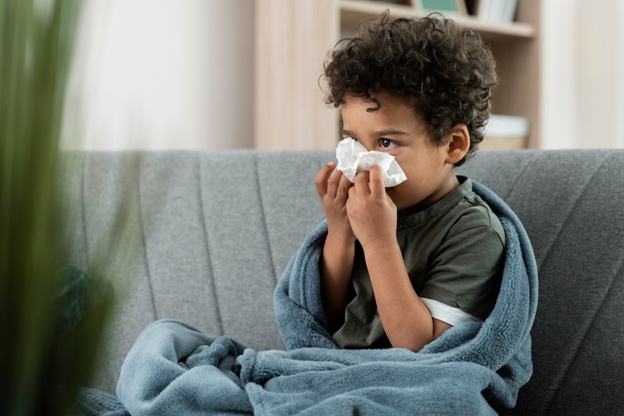Flu season can be a worrying time for parents, especially when it comes to children. At Sri Krishna’s Children Hospital, we want to help you understand the flu, how to spot it in your child, and what you can do to protect them.
What is the Flu?
The flu (influenza) is a contagious virus that affects the lungs and throat. It spreads when an infected person coughs, sneezes, or talks. Children, especially those under 5, are more likely to get the flu because their immune systems are still developing.
Unlike a common cold, the flu often comes suddenly and can be more serious. Knowing the difference between the flu and a cold is important, so you can get your child the right treatment if needed.
Common Flu Symptoms in Children
Flu symptoms can vary, but here are some of the most common signs:
- Fever: A sudden high fever (over 100.4°F or 38°C).
- Cough: A dry cough that doesn’t go away.
- Sore Throat: Your child may complain of a sore or scratchy throat.
- Runny or Stuffy Nose: Congestion is common.
- Body Aches: Your child may feel achy or complain of muscle pain.
- Fatigue: Your child might feel very tired or weak.
- Headache: Flu often causes headaches.
- Stomach Issues: Some children may experience vomiting or diarrhea, though this is less common.
If you notice these symptoms, contact your pediatrician at Sri Krishna’s Children Hospital to discuss next steps.
How the Flu Spreads and How to Prevent It
The flu spreads easily through droplets in the air when someone coughs or sneezes. It can also spread when a child touches surfaces with the flu virus and then touches their mouth, nose, or eyes.
Here are some ways to reduce the risk of your child getting the flu:
- Get the Flu Vaccine: The flu shot is the best way to protect your child from getting the flu. It’s recommended for all children over 6 months of age.
- Wash Hands Often: Teach your child to wash their hands with soap and water, especially after sneezing or touching public surfaces.
- Cover Coughs and Sneezes: Encourage your child to cover their mouth and nose with a tissue or elbow.
- Keep Your Child Away from Sick People: If someone at home is sick, try to limit contact with your child.
- Boost Immunity: A healthy diet and plenty of sleep help keep your child’s immune system strong.
What to Do If Your Child Gets the Flu
If your child gets the flu, make sure they rest, drink plenty of fluids, and follow your doctor’s advice. In some cases, antiviral medicines may be needed to reduce symptoms.
If your child has trouble breathing, a high fever that doesn’t go down, or severe symptoms, seek medical help right away.
Conclusion
Flu season can be tough, but with the right steps, you can help protect your child and manage the illness if it happens. The team at Sri Krishna’s Children Hospital is here to support you in keeping your child healthy this flu season.


